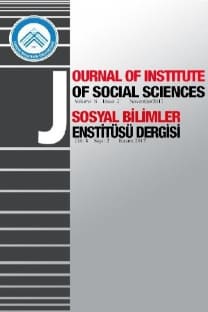Okul Öncesi Dönem Çocuklarının Sosyal Konumlarının Aile Değişkenlerine Bağlı Olarak İncelenmesi
Evaluation of Preschool Children’s Social Status in Relations to Family Variables
Social status, preschool period, mother-father education level, mother-father age sibling.,
___
- Abramovitch, R., Corter, C., Pepler, D.J., Stanhope, L. (1986). “Sibling and Peer Interaction: A final follow-up and a comparison”. Child Development, 57: 217–229.
- Asher, S.R., Singleton, L.C., Tinsley, B.R., Hymel, S. (1979). “A Reliable Sociometric Measure For Preschool Children”. Developmental Psychology, 15(4): 443-444.
- Barnett, R.C., Baruch, G.K. (1987). “Determinants of Fathers’ Participation in Family Work”. Journal of Marriage and Family, 49: 29-40.
- Barth, J.M., Archibald, A. (2003). “The Relation between Emotion Production Behavior and Preschool Social Behavior and Preschool Social Behavior: In the Eye of the Beholder”. Social Development, 12(1): 67-90.
- Beyazkürk, D., Anlıak, ù., Dinçer, Ç. (2007). “Çocuklukta Akran İlişkileri ve Arkadaşlık”. Eurasian Journal of Educational Research, 26: 13-26.
- Cillessen, A.H.N., Rose, A.J. (2005). “Understanding Popularity in the Peer System”. Current Directions in Psychological Science, 14(2): 102-105.
- Connor, D.F. (2004). Aggression and Antisocial Behavior in Children and Adolescents. The Guilford Press, New York.
- Cotton, S., Antil, J.K., Cunningham, J.D. (1990). “The Work Attachment of Mothers With Preschool Children”. Psychology of Women Quarterly, 14: 255-270.
- Çetin, F., Bilbay, A.A., Kaymak, D.A. (2002). Araştırmadan Uygulamaya Çocuklarda Sosyal Beceriler. Epsilon Yayıncılık Hizmetleri, İstanbul.
- Davis-Kean, P. (2005). “The Influence of Parent Education and Family Income on Child Achievement: The Indirect Role of Parental Expectations and the Home Environment”. Journal of Family Psychology, 19: 294–304.
- Dearing, E., McCartney, K., Taylor, B.A. (2001). “Change in Family Income Matters More for Children With Less”. Child Development, 72: 1779– 1793.
- Diesendruck, G., Ben- Eliyahu, A. (2006). “The relationships among social cognition, peer acceptance and social behavior in Israeli kindergarteners”. The International Society for the Study of Behavioral Development, 30(2): 137-147.
- Dunn, J. (1988). “Sibling Influences on Child Development”. Journal of Child Psychology and Psychiatry, 29(2): 119–127.
- Dunn, J.C., Dunn, J.G.H., Bayduza, A. (2007). “Perceived Athletic Competence, Sociometric Status, and Loneliness Elementary School Children”. Journal of Sport Behavior, 30(3): 249-263.
- Freeman, H., Newland, L.E., Coyl, D.D. (2008). “Father Beliefs as a Mediator Between Contextual Barriers and Father Involvement”. Early Child Development and Care, 178(7-8): 803-819.
- Fussel, J.J., Macias, M.M., Saylor, C.F. (2005). “Social Skills and Behavior Problems in Children With Disabilities With and Without Siblings”. Child Psychiatry and Human Development, 36(2): 227-241.
- Gifford-Smith, M.E., Brownell, C.A. (2003). “Childhood Peer Relationships: Social Acceptance, Friendships and Peer Networks”. Journal of School Psychology, 41: 235-284.
- Gülay, H. (2008). “5-6 Yaş Çocuklarına Yönelik Akran İlişkileri Ölçeklerinin Geçerlik Güvenirlik Çalışmaları ve Akran İlişkilerinin Çeşitli Değişkenler Açısından İncelenmesi”. Marmara Üniversitesi, Eğitim Bilimleri Enstitüsü, Doktora Tezi, İstanbul.
- Gülay, H. (2010). Okul Öncesi Dönemde Akran İlişkileri. Ankara: PegemA Yayıncılık.
- Hartup, W.W. (1989). “Social Relationship and Their Developmental Significiance”. American Psychologist., 44: 2.
- Hisley, B.A. (1989). “Temperament and Mother-Child Interaction: The Relationship Between Goodness of Fit and a Child’s Perceived Competence and Social Acceptance”. The University of Texas, PhD Thesis, USA.
- Howes, C., Tonyan, H. (1999). Peer Relations. (Eds. L. Balter ve C. S. Tamis-Le Monda). Child Psychology: A Handbook of Comtemporary Issues. Psychological Press, USA, pp. 318-335.
- Larson, J., Lochman, J. Edward. (2002). Helping School Children Cope With Anger. New York: The Guilford Press.
- Matta, D.S., Knudson-Martin, C. (2006). “Responsivity: Couple Processes and The Construction of Fatherhood”. Family Processes, 45: 19–37.
- Nagin, D.S., Tremblay, R.E. (2001). “Parental and Early Childhood Predictors of Persistent Physical Aggression in Boys From Kindergarten to High School”. Archives of General Psychiatry, 58: 389–394.
- Parke, R.D., Simpkins, S.D., McDowell, D.J., Kim, M., Killian, C., Dennis, J., Flyr, M.L., Wild, M., Rah, Y. (2004). Relative Contributions of Families and Peers to Children’s Social Development. (Eds. P. K. Smith ve C. H. Hart) Blackwell Handbook Of Childhood Social Development. Blackwell Publishing, USA, pp. 156-177.
- Pettit, G.S., Yu, T., Dodge, K.A., Bates, J.E. (2009). “A Development Process Analysis of Cross-Generational Continuity in Educational Attainment”. Merril-Palmer Quarterly, 55(3): 250-284.
- Polenski, T.A. (2001). Child Characteristics and Relations in The Family as Predictors of Peer Relationships. University of Pittsburgh, PhD Thesis, USA.
- Shin, H. (1996). Korean- American Mothers’ Self Reported Parenting Patterns and Children’s Social Competence. Iowa State University, PhD Thesis, USA.
- Stocker, C.M., Youngblade, L. (1999). “Marital Conflict and Parental Hostility: Links With Children’s Sibling and Peer Relationships”. Journal of Family Psychology, 13: 598–609.
- ùentürk, S. (2007). 5-6 Yaş Çocuklarının Çalışan ve Çalışmayan Annelerinin Çocuk Yetiştirme Tutumları İle Bu Çocukların Sosyal-Duygusal Uyum Düzeylerinin Karşılaştırılması. Marmara Üniversitesi, Eğitim Bilimleri Enstitüsü, Yüksek Lisans Tezi, İstanbul.
- Yu, J.J., Gamble, W.C. (2008). “Pathways of Influence: Marital Relationships and Their Association With Parenting Styles and Sibling Relationship Quality”. Journal of Child Family Studies. 17: 757-778.
- ISSN: 1309-3738
- Yayın Aralığı: 2
- Başlangıç: 2010
- Yayıncı: Prof. Dr. Coşkun POLAT
Maksatlı Bir Hikâye Anlatıcısı: Yahyâ Kemâl
Çankırı Yaran Meclisinde Bağlamanın Rolü
Terörizme Karşı Mücadele Modelleri
Türkiye’deki Fındık Üretimi ve Pazarlama Sorunlarına Global Bakış
Ahmet Şükrü ÖZDEMİR, Zeynep YILDIZ
Edebiyat; Toplumsal Hafızanın, Geleneğin Kaybında, İnşasında Ne Kadar Etkilidir?
Rol Kartlarının Konuşma Eğitimindeki Başarı ve Tutum Üzerine Etkisi
